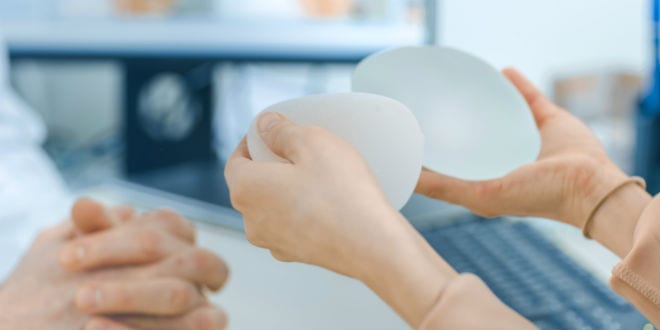Women who undergo a mastectomy due to breast cancer and those more fortunate who merely want to augments their bust have for years been undergoing surgery for the insertion of breast implants filled with silicone or saline (salt water).
While there have been numerous complaints about leaking as well as some immune reactions and other problems, patients have continued to want them and plastic surgeons to implant them.
But now, a global investigation just published by Britain’s The Guardian newspaper has revealed serious safety concerns caused by breast implants, plus a lack of clinical supervision of the women and failure to track long-term outcomes.
Some of the implants are pre-filled, while others are filled during the surgery. Silicone gel-filled implants are silicone shells filled with a plastic gel. Although many women say that the gel-filled implants feel more like real breasts than saline, they pose more of a risk if they leak.
The disclosures come from an analysis of official health records obtained through freedom of information requests and interviews in several countries by members of the International Consortium of Investigative Journalists. In the United Kingdom alone, there were 1,459 official reports of incidents related to breast implants in the last three years.
The investigation established links between popular textured implants and a rare type of cancer; the use of non-clinical-grade materials by leading manufacturers, according to evidence found by Dutch investigators; reports of ruptured implants, pain, disfigurement, allergic reactions and other symptoms; and huge numbers of women missing from clinical trials designed to monitor safety. The reports came from patients and healthcare workers. In three-quarters of cases, women needed another operation.
A recent large-scale study in the US confirmed links between breast implants and a range of rare illnesses, including several linked to the immune system. While the majority of those who took part said they were satisfied with their implants, researchers found women had higher incidences of two serious autoimmune diseases – Sjögren’s syndrome and scleroderma – than the general population.
Sjögren’s syndrome causes symptoms including a dry mouth and eyes, and swelling of the jaw, while scleroderma results in the immune system attacking the connective tissue under the skin and around internal organs. There were also higher incidences of rheumatoid arthritis, stillbirth and melanoma.
In the past, The Guardian reported, large-scale clinical studies of breast implants showed low rates of serious complications. However, there is now growing evidence that a significant number of women also experience problems and that in many case, the long-term outcomes are not tracked.
A third of reports involved “material separation” – meaning that the shell and the inside of the implant came apart or ruptured in some way. A quarter of the reports involved a leak. In 11 cases the implant was recorded as having “migrated”, and in six it had burst.
The investigation also revealed ongoing inadequacies in oversight, nearly a decade after the scandal by the French company Poly Implant Prothese (PIP) fraudulently sold hundreds of thousands of implants containing industrial-grade silicone.
Australia has set up a national breast devices database, but even there, experts said they struggle to get information quickly enough, The Guardian reported.
Dr. Nigel Mercer, a plastic surgeon who advises Britain’s Medicines and Healthcare Products Regulatory Agency on breast implants, said the registry was vital for revealing problems but needed to be compulsory. “Without the registry we have no idea how big a problem is. It does make sense from a public health point of view for it to be mandatory.”
In several countries, including the US and Canada, evidence was found of manufacturers combining hundreds of patient complaints into single “adverse incident” reports filed to regulators, covering up the true frequency of complications.
Last year, the US Food and Drug Administration ordered companies to file adverse events individually, rather than allowing them to report huge numbers of cases in one go. This led to a dramatic rise in the number of reports linked to breast implants – from 353 in 2016 to 4,651 in 2017, and 8,352 in the first six months of 2018.
The report concluded: “This study demonstrates silicone implants are associated with an increased risk of certain systemic harms.”
Associate Prof. Mark Clemens, a specialist in plastic and reconstructive surgery at the MD Anderson Cancer Center in Houston, Texas and one of the report’s authors, said: “We did see a statistical association with rare diseases. There were diseases that women with implants had at a higher rate than the general population’s and we need to study that further. He stressed that proving a link was not the same as proving that the implants caused the complications, and that more work is needed to study patients who had experienced problems.
The Israel Society for Plastic and Esthetic Surgery commented immediately on the report. Its chairman, Dr. Meir Cohen, said: “We are updated with all new information and are always concerned about women’s health and rights. These are rare and known side effects that we reported to the Health Ministry three months ago in a position paper. We must remember that esthetic treatment has complications and risks, and therefore every woman must remember that plastic surgery or aesthetic treatment of any kind is done only by a plastic surgery specialist.”
Cohen said the society recommends that women who have undergone breast augmentation or breast reconstruction who have no complaints should contact their surgeon 10 years later for a checkup. He added that the society was happy that no direct causal link was proven between undergoing an implant and the complications.
“We call upon the Health Ministry to adopt our recommendations for a uniform certificate of implantation when approval is given for the importation of implants into Israel and at the same time to establish a national database to document complications in the field of esthetic medicine.” The Israeli Society of Plastic and Aesthetic Surgery represents 300 specialists in plastic surgery and to promote and develop the profession in treatment, teaching and research.




